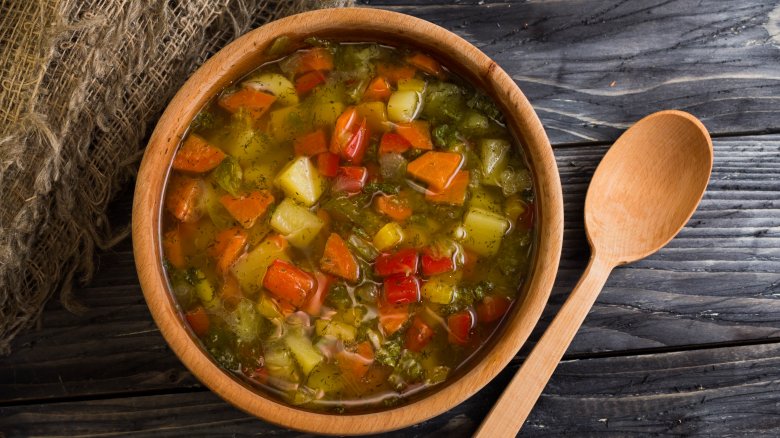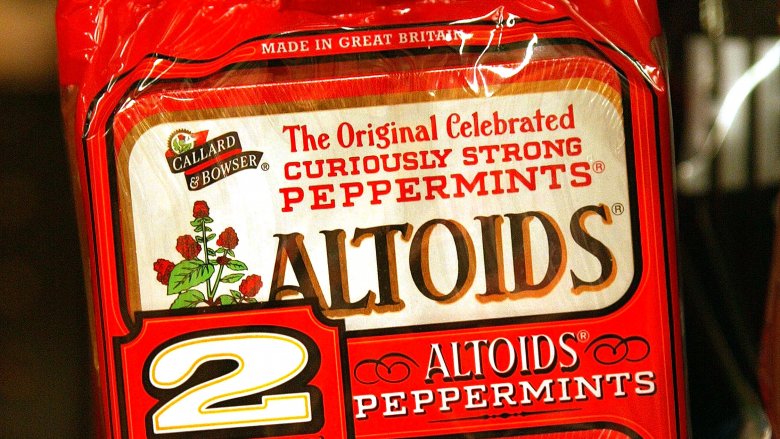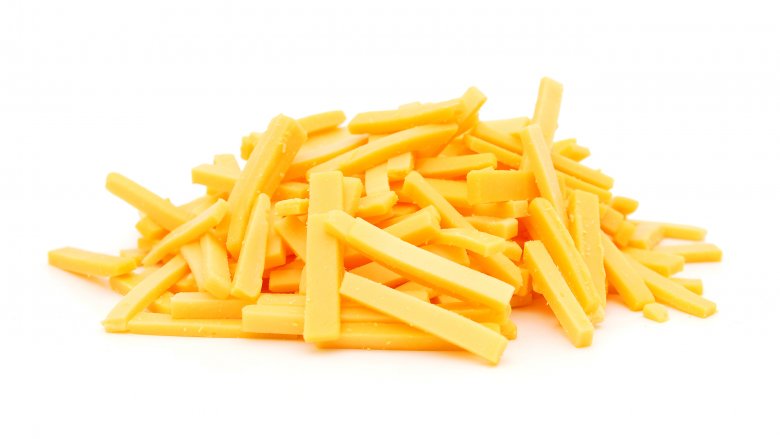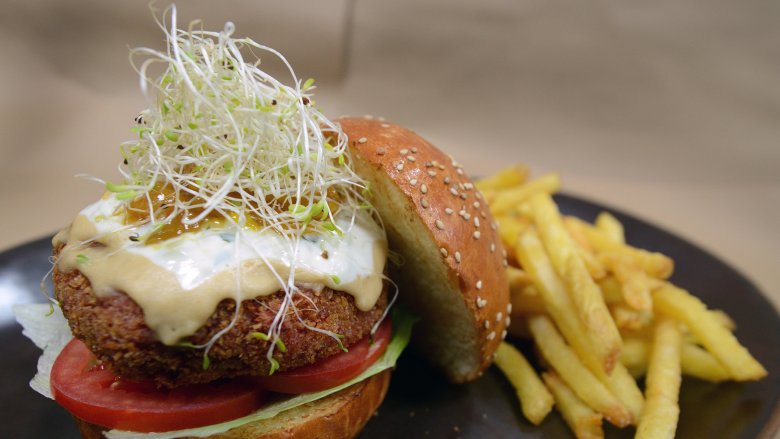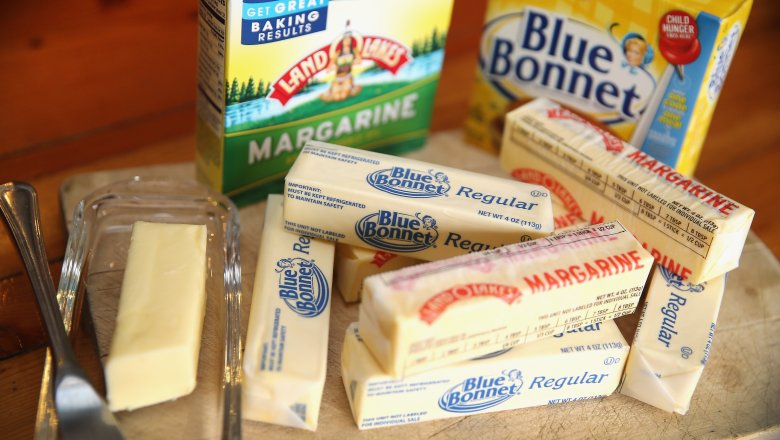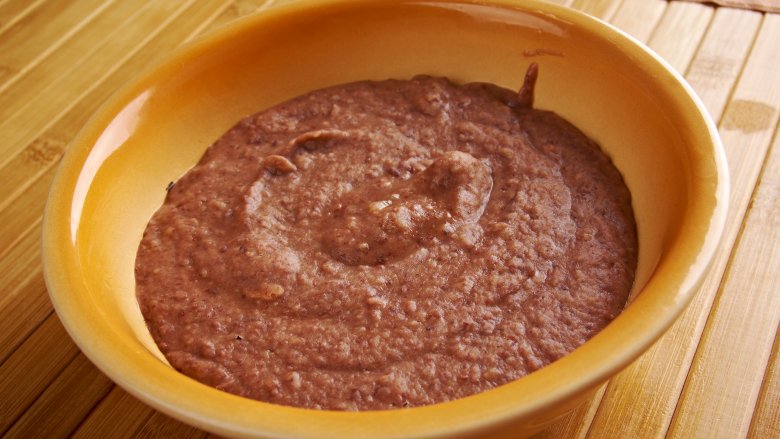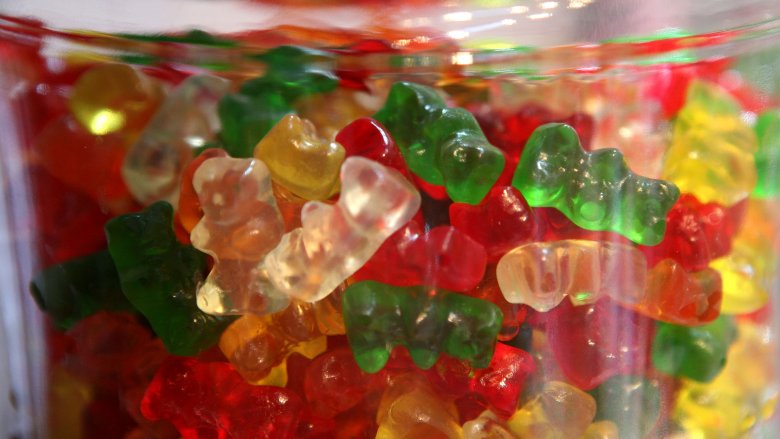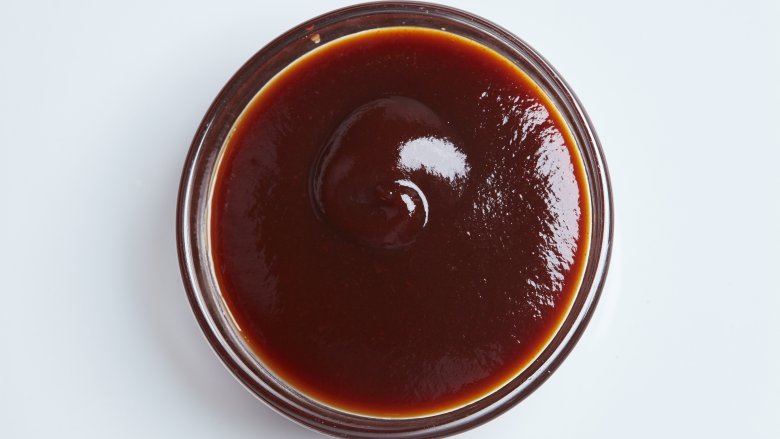Surprising Things That Are Not Vegan
Choosing to adopt a vegan diet means you have to be super careful when you're at the grocery store or a restaurant. It's one thing when you're purchasing whole foods like fruit, vegetables, and bulk grains. You can know for sure, for example, that dry beans get the green light, and that dried rice is a safe bet. But when it comes to processed, pre-packaged, or pre-made foods, let's face it — you're going to be reading labels every single time you go shopping. This is because everything from gelatin to casein to lard can be found in products that on the surface, appear to be vegan-friendly. So here's a list of surprising things that are actually not vegan.
Vegetable soup
Vegetable soup is a staple of vegan cuisine in many households. It's a great way to utilize leftover produce from the farmer's market, as well as a simple way to get a hot, satisfying meal on the table. And it's easy to make — chop veggies, add to stock, season, and simmer, and voila: dinner.
That's well and good as long as you are making it at home. It gets trickier if you're purchasing canned soup from the grocery, though, as some brands add non-vegan ingredients like beef or chicken stock to the soup base. For example, Campbell's Old Fashioned Vegetable soup is made with beef stock, which is definitely not vegan. And you can't trust their Vegetarian Vegetable soup either because the pasta in it contains egg whites. The same is true for Progresso's Classic Minestrone soup, which also has milk in it. So it's safe to say that most regular, store-bought soup is not a good vegan option — stick with brands like Amy's or make it yourself.
Booze
Beer, in all its hoppy glory, is a beautiful thing. It's cold, it's foamy, and it gets you buzzed. But surprisingly, there are plenty of beers out there that aren't vegan. In some cases it's obvious — a milk stout is going to have milk in it, and ales brewed with honey will have, well, honey. But in other cases it's not easy to tell. And the same is true for wine, which like beer, can surprisingly contain gelatin, animal proteins, fish proteins, milk, or egg. This is due to the fermentation process, which can utilize some of these ingredients.
Fortunately most hard liquor is vegan, unless it's blended with non-vegan ingredients like cream to make a liqueur. And if you're not sure? You can always check Barnivore, which has over 30,000 beers, wines, and liquors in its database. Bottoms up!
Altoids
Altoids have been around since 1780, which is a long time for a mint! And while they were originally sold as stomach soothers, today they're marketed as breath fresheners, and are available in several flavors.
On the surface, it seems like a no-brainer that these would be vegan. However, upon closer inspection, Altoids contain gelatin, which is animal-derived; it's created by boiling animal bones, ligaments, and skin in water and deriving it from that substance. So you should definitely avoid Altoids if you're vegan, and one could argue vegetarian as well.
There are vegan-friendly gelatin substitutes out there, so maybe Altoids will one day change their recipe to cater to their vegan customers.
Soy cheese
Soy is a staple of vegan diets. On top of being protein-rich, it's super versatile, and it sucks up flavor like a sponge. This is why you can find lots of soy products out there, like soy milk, soy sausage, soy chicken, etc. And of course, there's soy cheese for folks who are avoiding lactose or are eating a vegan diet.
But in spite of the sound of it, not all soy cheese is vegan — in fact, there are several brands that, while vegetarian-friendly, contain casein. Casein is a protein found in mammal's milk, which by definition means it's not vegan. So unless it explicitly states that it's vegan, you can pretty much assume that it isn't.
Veggie burgers
Few things are more American than a burger, so naturally there are a plethora of options for all kinds of eaters: beef, bison, chicken, portobello, and the ubiquitous "veggie" burger. These burgers are comprised of everything from soy to chickpeas to gluten along with a variety of vegetables and flavors. And often times, a veggie burger can be just as flavorful and satisfying as it's meaty counterpoint.
But again, like any prepared, pre-packaged food, the devil is in the details. The vast majority of veggie burgers contain all kinds of non-vegan ingredients, like eggs and milk, so it's not safe to assume you can count on them to be vegan. Unless they are marketed specifically to vegans, it's pretty safe to say they're not on the vegan portion of the menu. As usual, check the label carefully.
Margarine
Margarine has been around longer than you might think. According to documented history, it first showed up in a laboratory in France in 1813 — over 200 years ago. And ever since, margarine has enjoyed a storied history, both in America and abroad. It's also been especially helpful to vegans, who in looking for an alternative to butter (which is made from cow's milk), struck pay dirt. It's good for baking, spreading on toast, and serving as a fry base.
But with the proliferation of margarine has come in turn a proliferation of ingredients that get thrown into it, making it a minefield for vegan connoisseurs. For example, some margarines are blended with yogurt in order to give a lower fat, lower calorie spread option. Others have whey or milk, or so-called natural ingredients that aren't vegan.
Refried beans
Where would vegans be without beans? These versatile legumes are one of most nutritious foods out there, packed with protein, fiber, iron, potassium, and more. They're also low in fat and have no cholesterol. Plus, they're cheap and widely available. So it's no surprise that they're a staple food for vegans and vegetarians alike.
But when it comes to refried beans — beans that have been boiled in water, then mashed and fried with an added fat — there's no guarantee that they're vegan. That's because many recipes, especially more traditional ones, call for the addition of lard. Of course you can use oil instead of an animal fat, but many restaurants opt for the lard. So you'll definitely want to ask first.
Gummy candies
Few things evoke childhood nostalgia more than gummy candies, especially gummy bears. These sweet treats are one of Germany's gifts to the world, blending fruit flavors with a satisfying, gummy texture. But it's precisely that texture that renders these anthropomorphic chews a no-no for vegans — they contain gelatin. That makes these bears a little bit sinister given that they're literally made of boiled bones and skin.
Fortunately, there has been a proliferation of vegan gummy candy, so you can easily get your fix. It just has to state boldly on the package that it's definitely vegan.
Condiments
Condiments can be tricky to navigate for vegans given how many potential additives can render a sauce inedible for them. And while ketchup and mustard tend to be vegan by default, you'll have to read the label carefully (as usual) or ask the chef for a list of ingredients. Guacamole, for example, should be vegan, but, some folks add mayonnaise or cream to it. Pesto usually has Parmesan or Pecorino cheese in it, so opt for the chimichurri instead. Salad dressings can have cream or eggs added in, so oil and balsamic vinegar is a safer dressing choice. And BBQ sauce sometimes has milk or anchovy in it, surprisingly, so vegans should avoid that too unless it's clear that it doesn't contain non-vegan ingredients.

